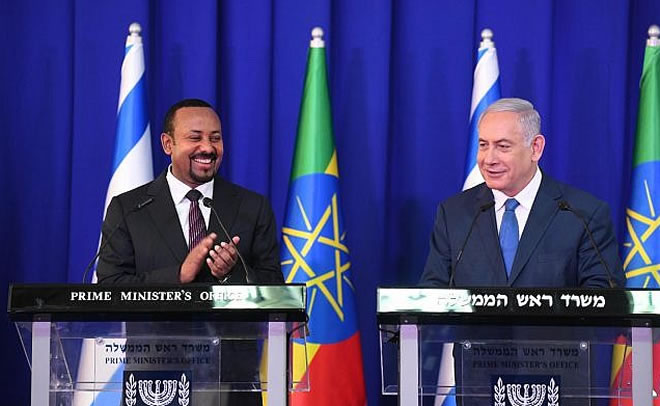
By RAPHAEL AHREN
Wednesday October 2, 2019

Prime Minister Benjamin Netanyahu (R) and Ethiopian Prime Minister Abiy Ahmed speak at a press conference at the Prime Minister’s Office on September 1, 2019. (Amos Ben Gershom/PMO)
Prime Minister Benjamin Netanyahu recently raised the idea of expelling Eritrean asylum seekers with the help of “innovative projects” by the Ethiopian government.
In a campaign clip published on the Likud party’s Facebook page a few days before the September 17 Knesset elections, Netanyahu recalled a meeting he had with Ethiopian Prime Minister Abiy Ahmed earlier that month.
“You know I made peace with Eritrea,” Netanyahu quoted his Ethiopian counterpart as telling him, referring to the July 2018 joint declaration that ended, at least formally, years of armed conflict between the two Eastern African nations.
“I have the possibility to help you with very innovative projects how to return the people to Eritrea, and to bring them back under wonderful conditions,” Netanyahu went on, still quoting Abiy.
He added: “I think his commitment to help here opens opportunities that we didn’t have before.”
Netanyahu said some of his discussions with Abiy cannot be disclosed, but asserted that the Ethiopian leader guaranteed to help Israel with its deportation of asylum seekers.
The Prime Minister’s Office refused to comment for this report.
The Eritrean embassy in Tel Aviv did not respond to several requests for comment.
Reached on Facebook, a worker for the Ethiopian embassy in Tel Aviv told The Times of Israel that the issue of Eritrean asylum seekers did not come up during the September 1 meeting between Netanyahu and Abiy.
“Nothing was raised regarding this issue during the meeting. The discussion was about strengthening the bilateral relations,” the official wrote.

Eritrean asylum seekers outside the Holot detention facility in southern Israel, January 29, 2018. (Luke Tress/Times of Israel)
The embassy subsequently did not respond to numerous requests for a formal response to Netanyahu’s claim in the election clip.
n the short video, the prime minister is seen talking with Tel Aviv-based anti-immigration activist and outgoing Likud MK May Golan. Netanyahu also told Golan that he wants her to head the Knesset subcommittee on immigration. However, Golan, who was 34th on the Likud list for Knesset, was not re-elected.
Currently, about 23,100 asylum seekers from Eritrea live in Israel, and more than 16,000 of them asked formally for asylum in the country. Only 13 applications have been approved, while 5,500 were rejected. The remaining applications are still pending.
According to Assaf — Aid Organization for Refugees and Asylum Seekers in Israel, Eritrea is a “repressive dictatorship, second only to North Korea,” which restricts basic freedoms.
The group welcomed last year’s peace treaty between Ethiopia and Eritrea, saying it “may mark the beginning of change for both countries, and for East Africa in general.” At the same time, in a position paper on the matter it warned that “so far the human rights situation in Eritrea has remained severe.”
The United Nations agency responsible for refugees recently asserted that, given ongoing human rights abuses in Eritrea, “the majority of Eritreans in Israel cannot safely return to their country,” according to Assaf.